The first time we met, Marla Anselona sat in front of one of her paintings. Strokes of brown, yellow, and red roiled into one another and created what looked like a canyon of flesh. The expanse of it made even the narrow window of Facetime feel massive.
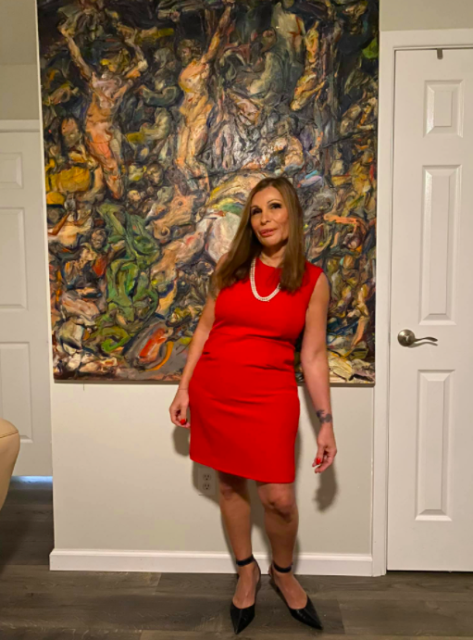
“I was a painter long before I became a cop,” Marla tells GO. Marla was raised the child of a textile fashion designer and a fireman. She joined the NYPD in the 1970s, and transitioned after retiring. She spent less time depicting the bodies of others and more time re-defining herself. She joined political action group, The Transexual Menace, to fight for transgender people’s rights to medical care, legal recognition, and protection from job discrimination. She appeared in Rosa von Praunheim’s documentary about the group of the same name.
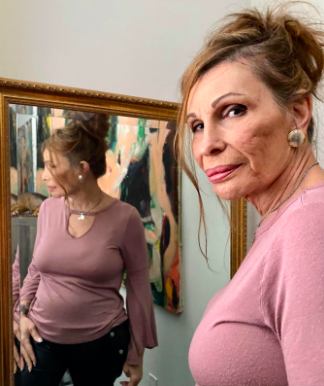
In her memoir, she charts with unflinching detail the development of an identity that changed as rapidly as the city around her. “I worked undercover in the police department and was undercover when I got dressed and went out,” she told me. “A cop, a junkie, a woman, a man; I always felt like I was on a mission, and I had to complete it. I was more afraid when I went out to clubs, dressed in drag, than I was when I was befriending a drug dealer or up in some apartment buying for the NYPD, with no gun or shield. I would’ve rather been found dead, in some dumpster, because a dealer found out I was a cop than been busted in drag.”
I talked with Marla about her time on the street, the costumes we wear, and how it feels to finally be getting back to work.
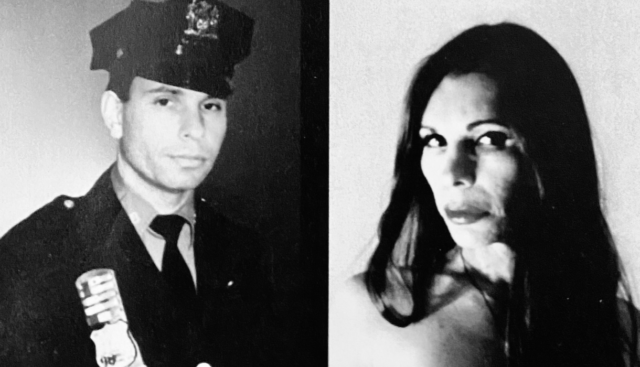
GO Magazine: How long were you a member of the police force?
Marla Anselona: I was a police officer for ten years before I was injured in the line of duty and retired. I was not out of the closet when I joined. I was living a dual life. A couple of times I ran into other police officers at places like the Hellfire Club or Paddles. Crossdressers and transvestites gravitated to S&M joints. Anyway, I made pacts with the cops I ran into at these places like this. “I won’t tell on you if you won’t tell on me.” But I was in a more vulnerable situation because I was crossdressed. They agreed but I said to myself, “This shit show is spiraling out of control. I need to stop and I need to just try to live my life as a man.” But I couldn’t stop. I couldn’t figure out exactly what was going on with me. You could not come out or fess up to this, on the job, in 1980, in NYPD. They would have taken your guns away. They would have psychoed you. So instead, I got married.
GO: How did you and your wife meet?
MA: When I met my ex-wife, she did not understand or speak a word of English. I worked in a Spanish neighborhood and that neighborhood was Bushwick. It wasn’t a trendy neighborhood back then, it was a shit hole. I remember the first day in the locker room. I was suiting up and a cop dressing next to me said “Welcome to the asshole of Brooklyn, kid.” Anyway, my ex-wife wound up there after escaping her father in Puerto Rico. She came here with her boyfriend. One night she called 911 because he became jealous, began harassing, started smacking her around. We threw him in the radio car, took him for a ride and dumped him off somewhere.
The next night, he came back and stabbed her in the leg. I communicated with her through her younger sister. That’s how our relationship bloomed and started.
GO: What happened next?
MA: The next step to solidify me as a man was having a kid. My partner, who I was working with, had just had a kid. I said “Well, okay. Then I’ll have one too.” [My] relationship was a mistake from the start. It began for the wrong reason and caused a lot of grief for a lot of people, but I would not do it differently because I have two beautiful daughters and five grandchildren today. I got to raise my youngest after my wife and I were divorced. She needed to go to work. Several years after I retired I got custody. My daughter, Vivian, lived a very bohemian lifestyle with me. I was in the arts and I had creative, outrageous friends. I was living in the West village at the time.
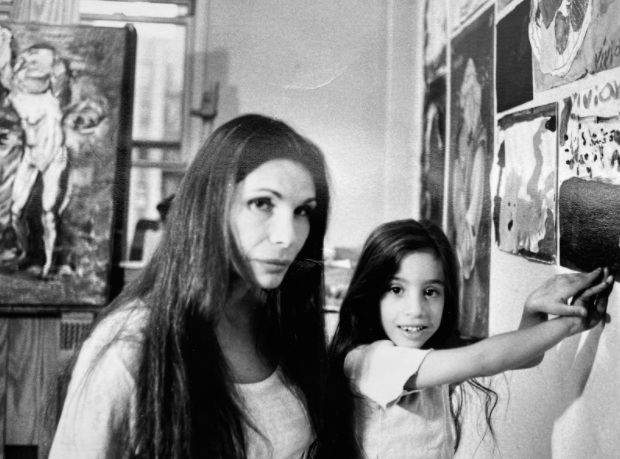
GO: In an ironic turn, you were also a sex worker for a while, right?
MA: After I had sex reassignment surgery, I got involved with prostitution. I thought there was a power that women had, and I wanted it. Getting paid was just the cherry on top of the cake.
It didn’t take that long to find out that wasn’t really power and it began to affect the way I viewed almost every relationship that I was emotionally invested in. I always felt like I was working. I felt like I was looking to get compensated, get paid. It screwed many of my love interests up.
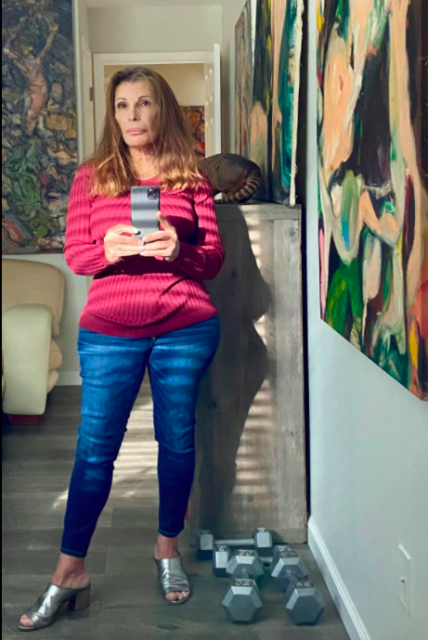
I chose my name because you had to change your name. I wanted a unique name and like I said, I was addicted to the power of being a woman. And at the time, Marla Maples was dating Donald Trump; she was a woman that I admired, wanted to emulate. She controlled the richest, most powerful man in the Big Apple. So I changed my name to Marla.
When I was growing up, my father always called me Mickey. I saw that there’s a woman in congress named Miki. I didn’t even have to change my name. I could just change the spelling of Mickey. Oh well, I’m Marla now. That’s the name of my autobiographical Memoir: I’m Marla Now—Mike Can’t Be Here.
GO: Can you tell me more about your painting?
MA: I was always attracted to the freedom in abstract expressionism painting. My work is very biomorphic. The lines and curves, the shapes that nature creates in the human form are very appealing to me. I find myself attracted to them. I had a colonoscopy one time. They gave me fentanyl and it did not knock me out all the way. So there I was, with a high definition camera in my colon, high as a kite. It was the most fucking beautiful thing that I’ve ever seen in the world.
GO: You paint and sell your work under the name Dill Anethum. Is that a working pseudonym?
MA: No, the reason for that is because I was an undercover cop, and I was paranoid that one of these fine, outstanding citizens that I befriended or copped drugs from is just getting out of jail about now, going to look up my name, going to come and put a cap in my ass. I still have that in the back of my mind but now I’m going to change it to Marla. I think it’s time for me to get over that crap.
GO: Can you tell me about your activism in the nineties?
MA: I was involved with the political action group called Transexual Menace (TM) which was founded by Riki Wilchins. It fought for legal rights, medical care and against job discrimination of transgender people. TM created an alliance and protested with Hermaphrodites with Attitude, who are affiliated with The Intersex Society of North America. They planted their flag at the Michigan Womyn’s Music Festival—when they didn’t allow transgenders there. They went to Washington D.C. with TOPS, Transgenders Officers Protect and Serve, to organize and demonstrate with other political activist groups from around the country during the trials of Tyra Hunter, a trans woman who was involved in a car crash and died from her injuries after EMTs refused to render her medical aid at the scene of the accident because she was transgender, and the rape and murder of Brandon Teena. At the same time, TM also lobbied in D.C. to gain support for equal rights.
In 1996 the TM movement became the subject of a documentary by iconic German filmmaker and gay liberation activist Rosa Von Praunheim, which he entitled “Transexual Menace;” the film featured the fabulous Eva Love and a cast of many other prominent Trans figures of the time including myself.
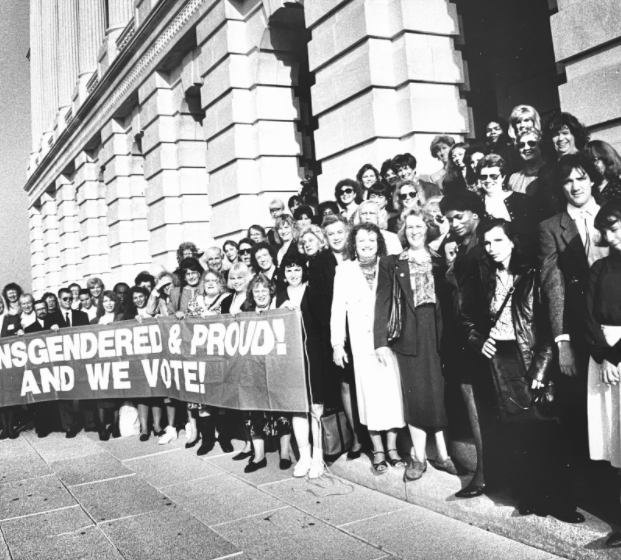
GO: Do you still feel like you’re working?
MA: Sometimes I do. Sometimes I’m going to go out for a drink and the whole ritual of getting ready feels like work, like I’m going on another buy operation, another mission.

What Do You Think?